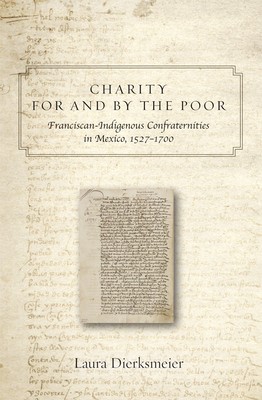
- We will send in 10–14 business days.
- Author: Laura Dierksmeier
- Publisher: University of Oklahoma Press
- Year: 2020
- Pages: 238
- ISBN-10: 0806166282
- ISBN-13: 9780806166285
- Format: 16.2 x 23.2 x 2.4 cm, hardcover
- Language: English
- SAVE -10% with code: EXTRA
Reviews
Description
Spanish colonization of Latin America in the sixteenth century continues to provoke scholarly debate. Spanish missionaries employed various strategies to convert indigenous inhabitants to the Catholic faith, including operating schools, organizing choirs, and establishing charitable brotherhoods known as confraternities. In Charity for and by the Poor, Laura Dierksmeier investigates how the reformed Franciscans' commitment to evangelizing Mexico gave rise to an extensive network of local confraternities and their respective care institutions. She finds that these local groups were the chief welfare providers for the indigenous people during the early colonial period and were precursors of the modern social security system. Dierksmeier shows how the Franciscan missionary imperative to promote the works of mercy and charity inspired the goals, governance, and operations of indigenous confraternities, their hospital and orphan care, and their contributions to the moral economy, including releasing debt prisoners and lending money to the poor. Focusing on the inner logic and daily practices of indigenous confraternities, Charity for and by the Poor highlights their far-reaching effects on Mexican society. Dierksmeier argues that confraternities are best studied within the religious framework that established them, and she does so by analyzing confraternity record books, lawsuits, last wills, missionary correspondence, and parish records from archives in Mexico, Spain, the United States, and Germany. The confraternity became an essential institution for protecting the indigenous population during epidemics, for integrating the various indigenous classes from the former Aztec Empire into the emerging social order, and for safeguarding indigenous self-governance within religious spheres. Most notably, Franciscan-established confraternities built social structures in which the poor were not only recipients of assistance but also, through their voluntary participation, self-empowered agents of community care. In this way, charity was provided for and by the poor.
EXTRA 10 % discount with code: EXTRA
The promotion ends in 18d.17:08:54
The discount code is valid when purchasing from 10 €. Discounts do not stack.
- Author: Laura Dierksmeier
- Publisher: University of Oklahoma Press
- Year: 2020
- Pages: 238
- ISBN-10: 0806166282
- ISBN-13: 9780806166285
- Format: 16.2 x 23.2 x 2.4 cm, hardcover
- Language: English English
Spanish colonization of Latin America in the sixteenth century continues to provoke scholarly debate. Spanish missionaries employed various strategies to convert indigenous inhabitants to the Catholic faith, including operating schools, organizing choirs, and establishing charitable brotherhoods known as confraternities. In Charity for and by the Poor, Laura Dierksmeier investigates how the reformed Franciscans' commitment to evangelizing Mexico gave rise to an extensive network of local confraternities and their respective care institutions. She finds that these local groups were the chief welfare providers for the indigenous people during the early colonial period and were precursors of the modern social security system. Dierksmeier shows how the Franciscan missionary imperative to promote the works of mercy and charity inspired the goals, governance, and operations of indigenous confraternities, their hospital and orphan care, and their contributions to the moral economy, including releasing debt prisoners and lending money to the poor. Focusing on the inner logic and daily practices of indigenous confraternities, Charity for and by the Poor highlights their far-reaching effects on Mexican society. Dierksmeier argues that confraternities are best studied within the religious framework that established them, and she does so by analyzing confraternity record books, lawsuits, last wills, missionary correspondence, and parish records from archives in Mexico, Spain, the United States, and Germany. The confraternity became an essential institution for protecting the indigenous population during epidemics, for integrating the various indigenous classes from the former Aztec Empire into the emerging social order, and for safeguarding indigenous self-governance within religious spheres. Most notably, Franciscan-established confraternities built social structures in which the poor were not only recipients of assistance but also, through their voluntary participation, self-empowered agents of community care. In this way, charity was provided for and by the poor.


Reviews